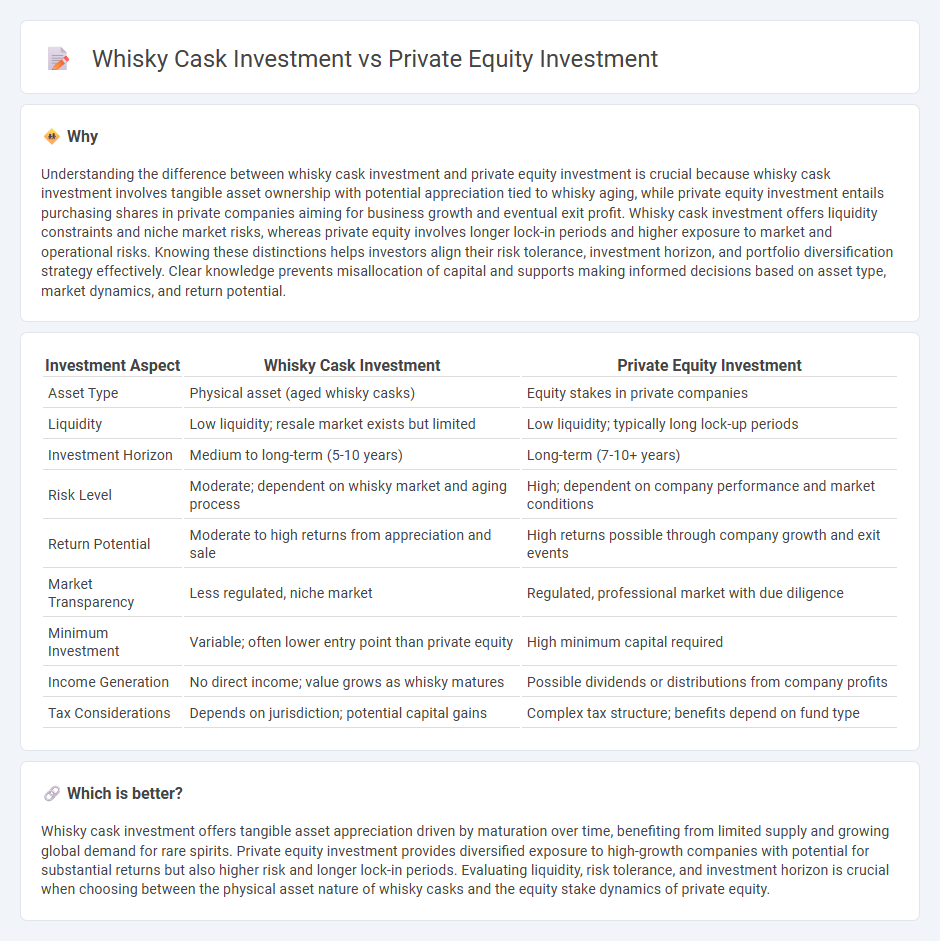
Whisky cask investment offers a tangible asset with potential for high appreciation due to aging and limited supply, contrasting with private equity investments that focus on funding private companies for growth and often require longer lock-in periods. Whisky casks provide liquidity through secondary markets and the allure of a unique luxury commodity, while private equity typically entails higher risk with opportunities for significant financial returns via company performance. Explore the advantages and risks of whisky cask versus private equity investments to inform your portfolio strategy.
Why it is important
Understanding the difference between whisky cask investment and private equity investment is crucial because whisky cask investment involves tangible asset ownership with potential appreciation tied to whisky aging, while private equity investment entails purchasing shares in private companies aiming for business growth and eventual exit profit. Whisky cask investment offers liquidity constraints and niche market risks, whereas private equity involves longer lock-in periods and higher exposure to market and operational risks. Knowing these distinctions helps investors align their risk tolerance, investment horizon, and portfolio diversification strategy effectively. Clear knowledge prevents misallocation of capital and supports making informed decisions based on asset type, market dynamics, and return potential.
Comparison Table
| Investment Aspect | Whisky Cask Investment | Private Equity Investment |
|---|---|---|
| Asset Type | Physical asset (aged whisky casks) | Equity stakes in private companies |
| Liquidity | Low liquidity; resale market exists but limited | Low liquidity; typically long lock-up periods |
| Investment Horizon | Medium to long-term (5-10 years) | Long-term (7-10+ years) |
| Risk Level | Moderate; dependent on whisky market and aging process | High; dependent on company performance and market conditions |
| Return Potential | Moderate to high returns from appreciation and sale | High returns possible through company growth and exit events |
| Market Transparency | Less regulated, niche market | Regulated, professional market with due diligence |
| Minimum Investment | Variable; often lower entry point than private equity | High minimum capital required |
| Income Generation | No direct income; value grows as whisky matures | Possible dividends or distributions from company profits |
| Tax Considerations | Depends on jurisdiction; potential capital gains | Complex tax structure; benefits depend on fund type |
Which is better?
Whisky cask investment offers tangible asset appreciation driven by maturation over time, benefiting from limited supply and growing global demand for rare spirits. Private equity investment provides diversified exposure to high-growth companies with potential for substantial returns but also higher risk and longer lock-in periods. Evaluating liquidity, risk tolerance, and investment horizon is crucial when choosing between the physical asset nature of whisky casks and the equity stake dynamics of private equity.
Connection
Whisky cask investment and private equity investment both involve acquiring tangible or financial assets with the goal of generating significant long-term returns. Whisky casks represent alternative, less liquid assets that appreciate in value over time, similar to private equity stakes in private companies aiming for capital growth. Both investment types require deep market knowledge, risk assessment, and strategic holding periods to optimize profitability.
Key Terms
Ownership Structure
Private equity investment involves acquiring equity stakes in private companies, typically resulting in shared ownership with other investors and management teams. Whisky cask investment grants investors ownership of physical barrels of aged whisky, providing direct asset control and the potential for value appreciation as the whisky matures. Explore the nuances of these ownership structures to determine which aligns best with your investment goals.
Liquidity
Private equity investments typically involve longer lock-in periods, limiting liquidity as funds are often tied up for several years before exit opportunities arise. Whisky cask investments offer greater liquidity through the possibility of secondary market sales and auction platforms, enabling investors to access capital more flexibly. Explore the advantages and risks of each investment type to determine which aligns best with your liquid asset preferences.
Asset Appreciation
Private equity investment often offers substantial asset appreciation through strategic business growth and value creation within portfolio companies. Whisky cask investment appreciates in value based on rarity, aging process, and increasing global demand for collectible spirits. Explore the distinct mechanisms behind asset appreciation in these investment options to make an informed decision.
Source and External Links
An Introduction to Private Equity Basics | Morgan Stanley - Private equity (PE) involves investing in private companies or assets not listed publicly, where fund managers (general partners) build portfolios of private companies and typically hold these investments for several years before exiting at a gain through sales or IPOs, making PE a largely illiquid, long-term investment strategy.
Private equity - Wikipedia - Private equity is stock in private companies offered to specialized funds, where investment managers raise capital from institutional investors to acquire stakes using equity and debt, aiming for returns through revenue growth, margin expansion, debt paydown, and valuation multiple increases over a typical 4-7 year period.
Private Equity: What You Need to Know - KKR - Private equity managers invest in non-publicly traded companies and seek to improve performance by strengthening management, acquiring businesses, shaping strategy, launching new products, streamlining operations, and optimizing capital structure to enhance growth and value.
 dowidth.com
dowidth.com